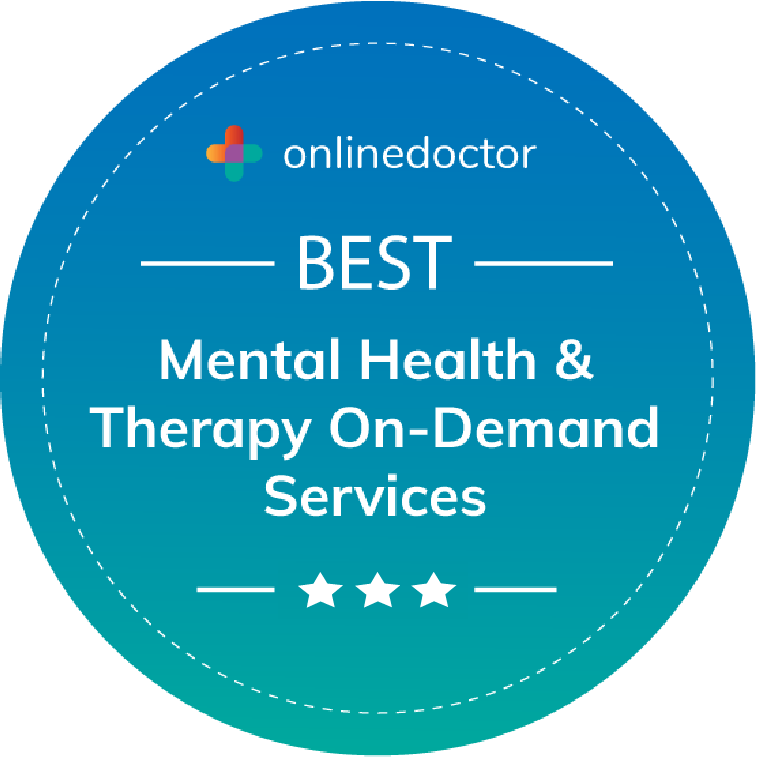The Top 7 Online Mental Health & Therapy On-Demand Services of 2025
TABLE OF CONTENTS
- I. The Best Online Mental Health &; Therapy On-Demand Services of 2025
- II. How We Chose the Best Online Mental Health & Therapy On-Demand Services
- III. The Top 7 Online Mental Health & Therapy On-Demand Services
- IV. What You Need to Know About Online Mental Health & Therapy On-Demand Services
- V. Latest News
- VI. Sources
I. The Best Online Mental Health &; Therapy On-Demand Services of 2025
BetterHelp — Best Overall
BetterHelp tops our list of the best on-demand therapy services thanks to its flexible communication methods, affordable pricing, and team of more than 14,000 dedicated, trained mental health professionals.
Ritual – Best for Couples
Available for individuals and couples, Ritual provides ongoing video sessions with trained relationship experts for people hoping to improve their connection with their partners.
Sesame – Best for the Underinsured
Sesame’s dynamic marketplace gives patients the tools to see a doctor or specialist, get a prescription or lab, and more – regardless of location, income, or insurance status.
Talkspace — Best for Convenient Communication
When it comes to accessible, convenient care, Talkspace is an ideal platform with its primary therapy delivery method of unlimited audio, video, and text messages between clients and their therapists.
Amwell — Best for Insurance Coverage
As this full-service telehealth platform accepts insurance from many major providers, including Aetna, Cigna, and United Healthcare, Amwell makes therapy accessible and affordable to many patients.
MDLive — Best for Medication Management
MDLive provides both counseling and psychiatry services, meaning that members also have access to physicians who can prescribe medication when applicable in addition to therapy.
Pride Counseling — Best for LGBTQ+
Pride Counseling’s therapists specialize in working with members of the LGBTQ+ population in order to provide discreet, affordable, and convenient care for the unique needs of this community.
II. How We Chose the Best Online Mental Health & Therapy On-Demand Services
Online mental health and therapy services provide the same competent, compassionate care as their in-person counterparts. We focused on evaluating the criteria that make online therapy services unique and convenient.
Because pricing for these services varies depending on factors like insurance and subscription plans, we did not factor in cost. Instead, we selected services that may fit a range of budgets.
Communication methods
Because on-demand therapy services are all about convenience and creating connection, we looked for platforms that give users a variety of simple yet secure ways to communicate with their therapists, including phone calls, video chats, and instant messaging.
Available specialties
We sought services that offer treatment for a range of specialties, like anxiety, depression, grief counseling, eating disorders, and addiction, among others,, as well as those that serve specific populations, like couples, teens, and the LGBTQ+ community.
Patient choice
Choosing a therapist is a personal process, as this must be an individual with whom you feel comfortable and can build trust. We focused on services that have tools to match patients with an appropriate counselor, and give patients the option to switch counselors if they don’t feel their current counselor isa good fit.
III. The Top 7 Online Mental Health & Therapy On-Demand Services
BetterHelp – Best Overall

Since its launch in 2013, BetterHelp has been used by nearly 700,000 clients by offering access to 14,000 licensed, credential therapists that can help with issues like stress, anxiety, depression, self-esteem, grief, and interpersonal relationships.
BetterHelp’s platform is straightforward. Users sign up and complete a brief questionnaire about their history and the issues they are seeking to address. They can also note any counselor preferences, such as gender or specialization. BetterHelp will match the client with a counselor, who they can connect with via phone call, video, or live chat.
BetterHelp’s services also include unlimited secure messaging between patient and counselor, and an online journal with a feature where the client can share entries with their counselor. BetterHelp’s affiliates, Regain.us and TeenCounseling.com specialize in couples and teens respectively. BetterHelp users access services via web browser or mobile app.
| Price | Accepts Insurance | Other Features |
| $60 to $90 per week (billed monthly) | No | — Mobile app — Subscription-based service — Couples and teen therapy — More features at Better Help |
Pros & Cons of BetterHelp
Pros:
- BetterHelp is one of the largest online counseling platforms, with over 14,000 licensed therapists. After completing a brief questionnaire, you will be matched with a councilor within a few days, making the process quick and straightforward.
- BetterHelp also offers both asynchronous, unlimited chatting with your counselor, available 24/7, as well as scheduled live chat, phone, or video call options. All communication is done within a private and secure “meeting room,” which clients can revisit to review old chats and discussion points from previous sessions. BetterHelp also has an online journal feature that allows for tracking progress and sharing entries with your counselor.
Cons:
- The main con of BetterHelp is that the platform does not accept any health insurance to cover the cost of services.
- Another drawback is that they do not have any psychiatrists on staff, meaning that clients who may need prescription medications to help them manage their mental health care needs will have to go elsewhere for those services.
What Customers Are Saying
BetterHelp users most often praise the skills of their counselors. One client writes, “The biggest achievement I’ve made is, truly, fighting for myself. Through working with Aiko and taking the time to discuss various issues with her, I’ve become a bigger advocate for myself, and I’m so proud of that.”
Scores
Ease of use: 95/100
Convenience factor: 90/100
Technology: 90/100
Personalization: 85/100
Overall score: 90/100
Ritual – Best for Couples
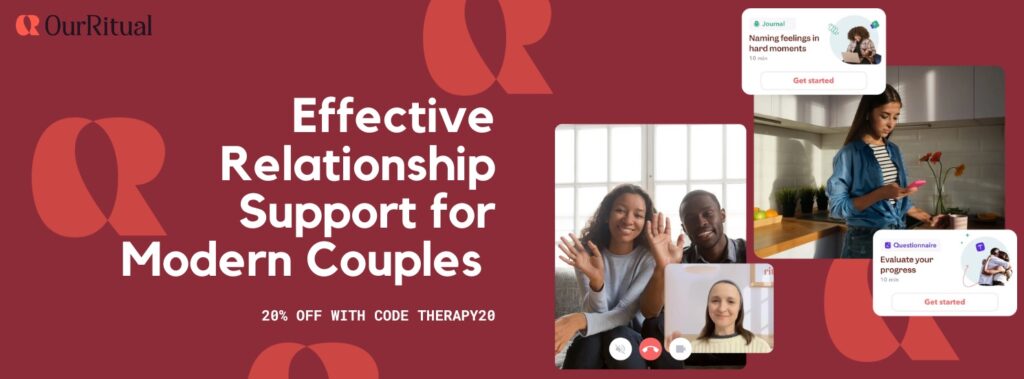
Ritual is an online therapy service specifically intended for people who are in a relationship with a partner. Although Ritual draws from elements of traditional couples’ therapy, you may complete your sessions with or without your partner present. The company also uses science-backed relationship research and findings from various couple surveys.
You’ll begin Ritual with an introductory session, during which you can discuss your relationship goals and problems with a trained expert. Once this session concludes, you’ll receive a personalized therapy plan based on your initial discussion. Most plans consist of individual relationship goals known as your “Pathways.” If your partner also takes part in the introductory session, their needs are also integrated into the Pathways.
You can opt for weekly or bi-weekly video sessions with Ritual’s trained experts. The length of these sessions varies, but most last 15 to 20 minutes. You’ll also receive weekly videos with relationship tips, journal prompts, and exercises intended to bring you and your partner closer. The Ritual app also contains a library of tools and resources.
The length of your therapy depends on how many Pathways you receive with your personalized plan. The average Ritual client spends 1 to 2 months on each Pathway. Users receive a 20% membership discount with the discount code “Therapy20”. Discount is automatically applied at checkout when you click on the link above.
| Price | Accepts Insurance | Other Features |
| Individual: $128/month Couples: $208/month |
No | —Mobile app —Subscription-based services —Individual and couples therapy options —More features at Ritual |
Pros & Cons of Ritual
Pros
- One of Ritual’s major selling points is the relaxed format of its one-on-one sessions. Most sessions last 20 minutes or less, and you may conduct your meeting alone or with your partner present depending on your selected plan.
- Although you’ll receive videos with exercises, activities, and journal prompts, most people only spend up to 10 minutes per day on their Ritual assignments. There’s no pressure from your assigned expert to complete everything.
- Each Ritual Pathway follows an asynchronous schedule, and lasts as long as you need to feel you’ve made enough progress. You’ll pay for the service on a monthly basis, and you can cancel your subscription at any time.
- Most Ritual experts hold professional Ph.D. or M.S.W. titles. That said, you can request a new point person if you aren’t satisfied with the expert initially assigned to you.
Cons
- Ritual may not be suitable for anyone seeking traditional couples’ therapy. The sessions are on the shorter side, and somewhat informal.
- Subscription rates range from moderate to high, depending on whether you participate in Ritual sessions alone or with your partner, and Ritual does not accept insurance at this time.
What Customers Are Saying
Ritual customers generally seem satisfied with their relationship progress as they complete their sessions, and some have noted a strong connection with their assigned experts. “Our sessions give me so much to think about,” one member says. “Conversations with my wife are already so different. I am really motivated to continue!”
Scores
Ease of use: 90/100
Convenience factor: 95/100
Technology: 80/100
Personalization: 95/100
Overall score: 90/100
Sesame – Best for the Underinsured
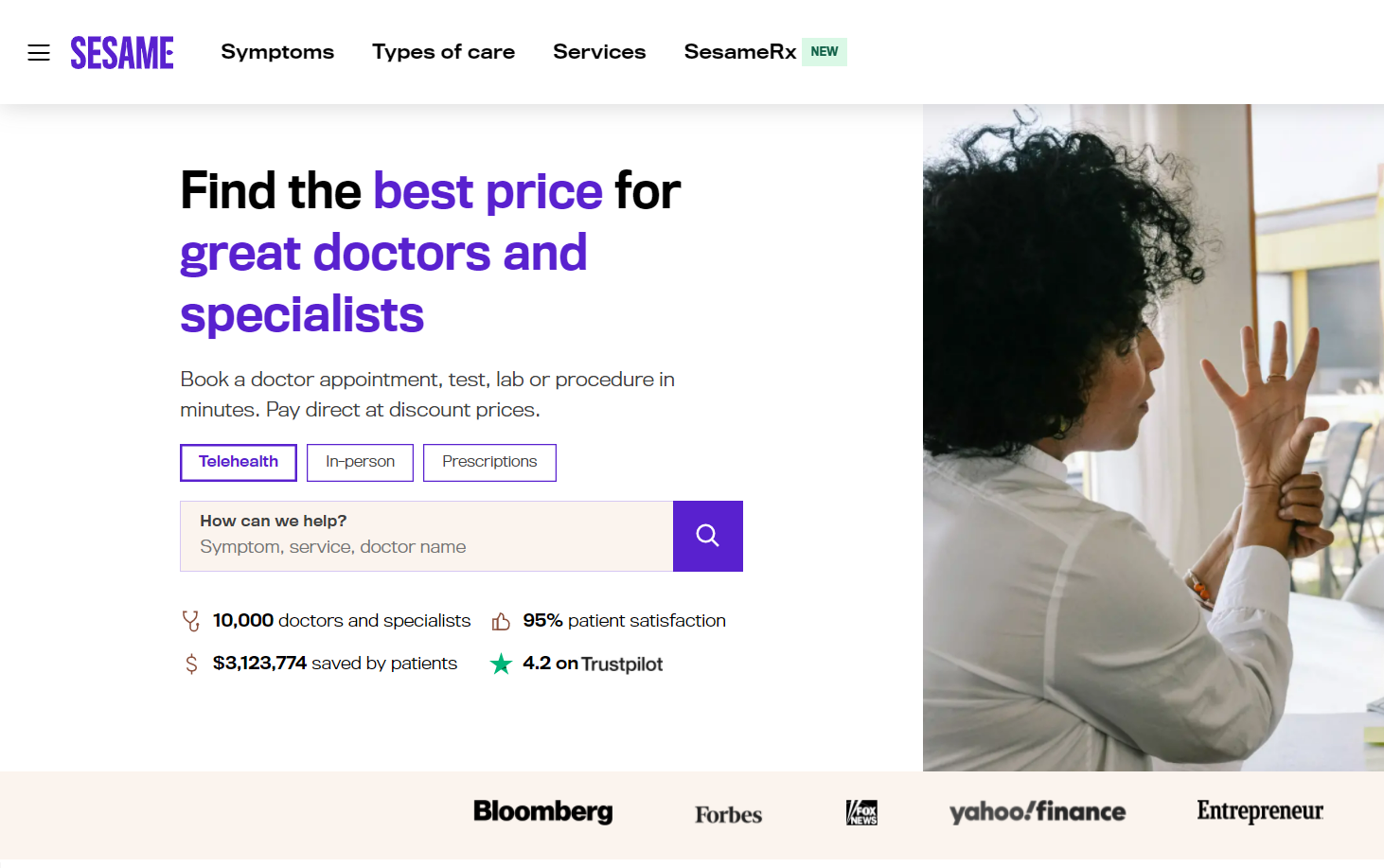
Sesame describes itself as a “superstore for great doctors and specialists,” providing a database of care options at discounted prices by paying care providers directly. Sesame can help you find a wide range of services in your area, from mental health and prescriptions to dentistry and urgent care. Their website also allows you to search for care in four different ways – by location, by care type, by specialty, or by symptom – so you should have no problem finding mental health resources that suit your needs.
| Price | Accepts Insurance | Other Features |
| Free for basic membership $7 per month for Plus membership $105 Video mental health consult |
No | –Discounted rates for therapists and specialists –Telehealth options –Free lab or blood test per year (with Plus membership) –Discounts on prescriptions –More features at Sesame |
Pros and Cons of Sesame
Pros:
- Not dependent on insurance coverage
- Easy to navigate database of available services in your area
- Plus membership offers good value for its monthly fee
Cons:
- Doesn’t accept health insurance, even if you have it
- Not available in all regions. Check Sesame’s website to see if the service is available in your area
What Are Customers Saying?
“I don’t have insurance and couldn’t risk paying hundreds for bill. Knowing how much to pay upfront meant I could actually afford my doctor on Sesame.”
Scores
Ease of use: 95/100
Convenience factor: 90/100
Technology: 90/100
Personalization: 80/100
Overall score: 89/100
Talkspace – Best for Convenient Communication
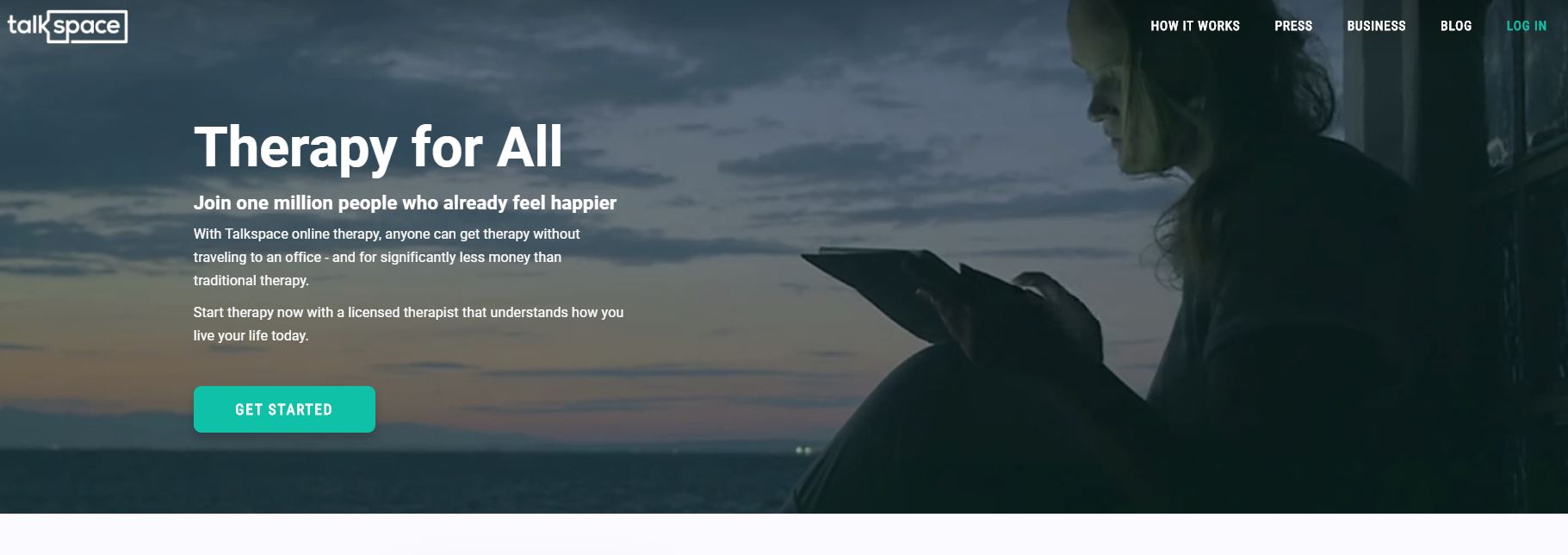
Talkspace offers clients multiple options to tailor the service to their specific needs. With multiple tiered plans, clients can choose the type of service that works best for them and their lifestyle. The platform also provides users with a private, text-based chat room where they can send text, audio, and video messages as well as pictures to their therapist.
After an initial consultation, during which clients answer a brief questionnaire, the experts at Talkspace match clients to their therapist. Choosing a counselor is an important and very personal aspect of therapy. Talkspace also allows users to Seamlessly switch therapists, at no extra cost, should a suggested counselor not work out for any reason.
All Talkspace therapists are licensed and accredited and can offer help in a variety of areas, including depression, anxiety and stress, parenting, chronic illness, eating disorders, trauma and grief, family conflict, and more. Talkspace also offers specific plans for couples and teen counseling. In addition to licensed therapists, Talkspace also employs psychiatrists, who have the authorization to write prescriptions for medications. Though Talkspace is one of the more expensive options on our list, thanks to partnerships with a number of U.S. health plans, the service is now covered by insurance for over 40 million Americans.
| Price | Accepts Insurance | Other Features |
| Unlimited Messaging Therapy Plus: $260/month Unlimited Messaging Therapy Premium: $316 Unlimited Messaging Therapy Ultimate: $396 Couples Therapy: $396 Teen Therapy: $260 |
Yes | — Mobile app — Subscription-based service — Couples and teen therapy — More features at TalkSpace |
Pros & Cons of Talkspace
Pros:
- Talkspace’s main pro is that most communication between clients and their therapists is done asynchronously, via text, video, and audio messages. This makes it an ideal platform for users who are in situations that prevent them from scheduling regular live sessions with their therapist.
- Another key benefit of Talkspace is that, through partnerships with a number of U.S. health plans, the service is now covered by insurance for over 40 million Americans. Clients should check with their insurance provider to confirm that it covers telehealth services before signing up with Talkspace.
- In addition to licensed therapists, Talkspace also employs psychiatrists, who have the authorization to write prescriptions for medications to help manage mental health needs, as deemed appropriate by all parties.
- Talkspace also offers counseling services in multiple languages, including Spanish, French, Italian, Japanese, Simplified Chinese, and others.
Cons:
- While some users may like that Talkspace’s primary therapy delivery method is asynchronous messaging, others may be disappointed that live, one-on-one counseling sessions via video chat are only available with more expensive premium subscription plans.
- Additionally, users who do take advantage of plans that include live sessions should note that live sessions are only 30 minutes, whereas most therapy sessions, whether they are in-person or online, are typically 45-50 minutes.
What Customers Are Saying
Talkspace customers like the service for making it convenient and easy to get the help they need. “I’m glad I gave Talkspace a try,” says one customer. “This app works great for me and my lifestyle, and I have an amazing psychologist who is very responsive.”
Scores
Ease of use: 90/100
Convenience factor: 90/100
Technology: 90/100
Personalization: 70/100
Overall score: 85/100
Amwell – Best for Insurance Coverage
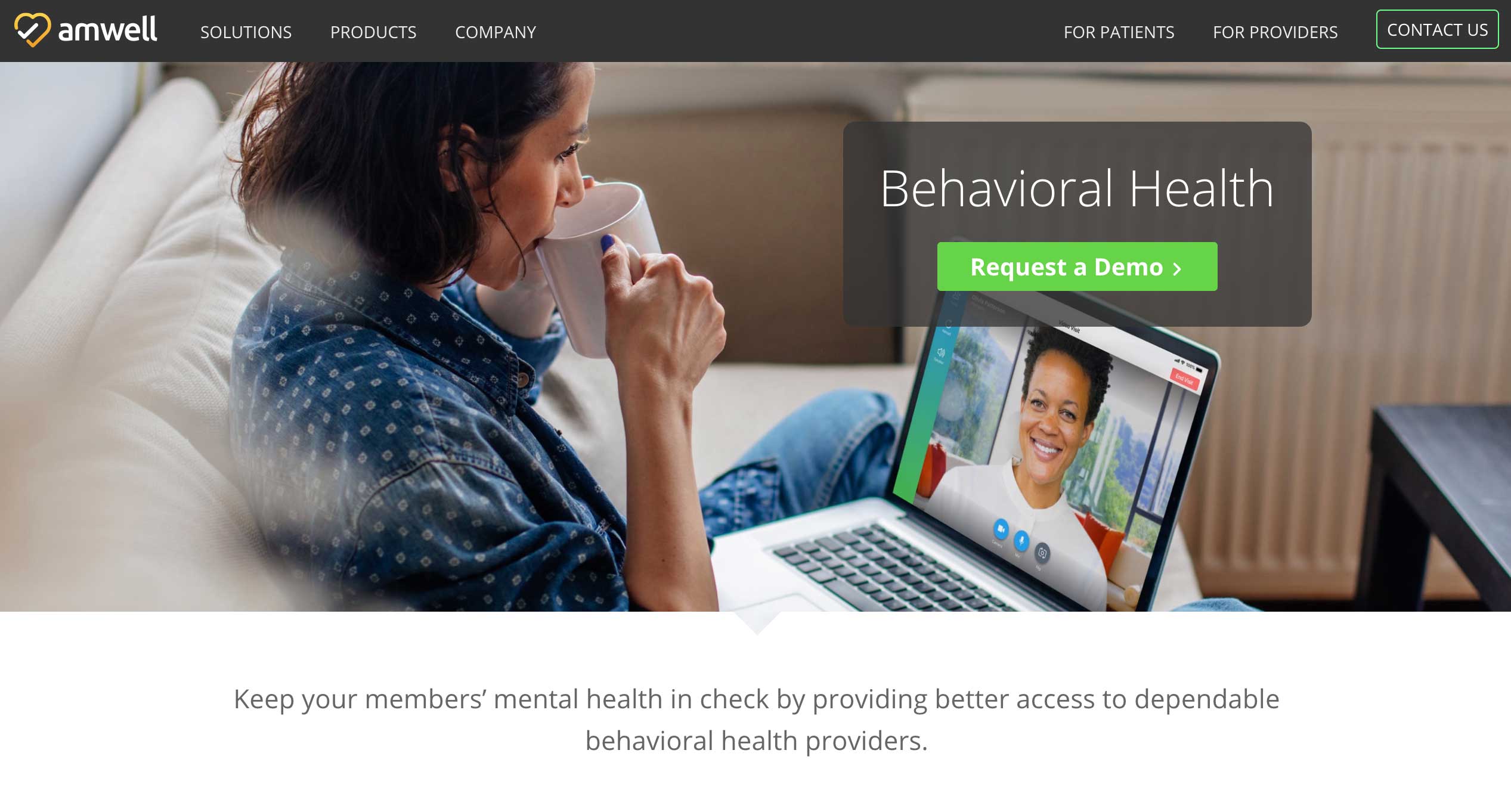
Amwell is a robust telehealth platform that offers mental and behavioral healthcare as part of its menu of services.
Users can speak to a therapist on-demand or schedule an appointment via Amwell’s website or mobile app. Amwell’s roster of mental health professionals includes doctoral-level psychologists, and master’s-level therapists and social workers who are licensed and trained in providing interventions and treatment via telehealth.
Unlike other services on our list, Amwell charges customers per visit, not on a subscription basis, meaning it may be a more ideal choice for those who seek temporary counseling or fewer sessions per billing period. Amwell charges customers a flat fee, although they also accept many major insurances, which may help decrease the cost. In addition to adult therapy, Amwell also provides child and adolescent therapy for individuals ages 10-17.
| Price | Accepts Insurance | Other Features |
| Master’s-level therapist: $99 per visit
PhD-level therapist: $110 per visit |
Yes | — Mobile app — 24/7/365 access — Spanish language available — More features at Amwell |
Pros & Cons of Amwell
Pros:
- A key benefit to using Amwell for therapy services is that the platform accepts insurance from many major providers. Clients should confirm with their insurance provider that they cover Amwell’s teletherapy services prior to scheduling an appointment.
- Another pro of AmWell’s online therapy services is that they have psychiatrists available, so users can easily connect with a doctor that has prescription-writing privileges if they need medication to help manage their mental health issues.
- In addition to individual therapy services, Amwell also offers counseling for children and teens ages 10-17, with parental or guardian consent.
Cons:
- Of all of the therapy services we reviewed, Amwell’s are the most expensive, with each session with a doctoral-level therapist costing $110. For individuals who have insurance that covers teletherapy, this price may be lower, but for uninsured individuals, Amwell’s price points may present an obstacle to care.
- All Amwell therapy sessions are conducted via video chat, meaning clients must have a device with a camera and microphone. Unlike some other platforms on our list, they do not offer the option for clients to exchange messages with their therapist between sessions.
What Customers Are Saying
Amwell’s mental health services receive praise from customers for being attentive and invested. “The care exceeds what I have received from any in-office psychiatrist over the years,” writes one Amwell patient. “I feel I am being listened to and that my case is being truly considered.”
Scores
Ease of use: 90/100
Convenience factor: 75/100
Technology: 80/100
Personalization: 95/100
Overall score: 85/100
MDLive – Best for Medication Management
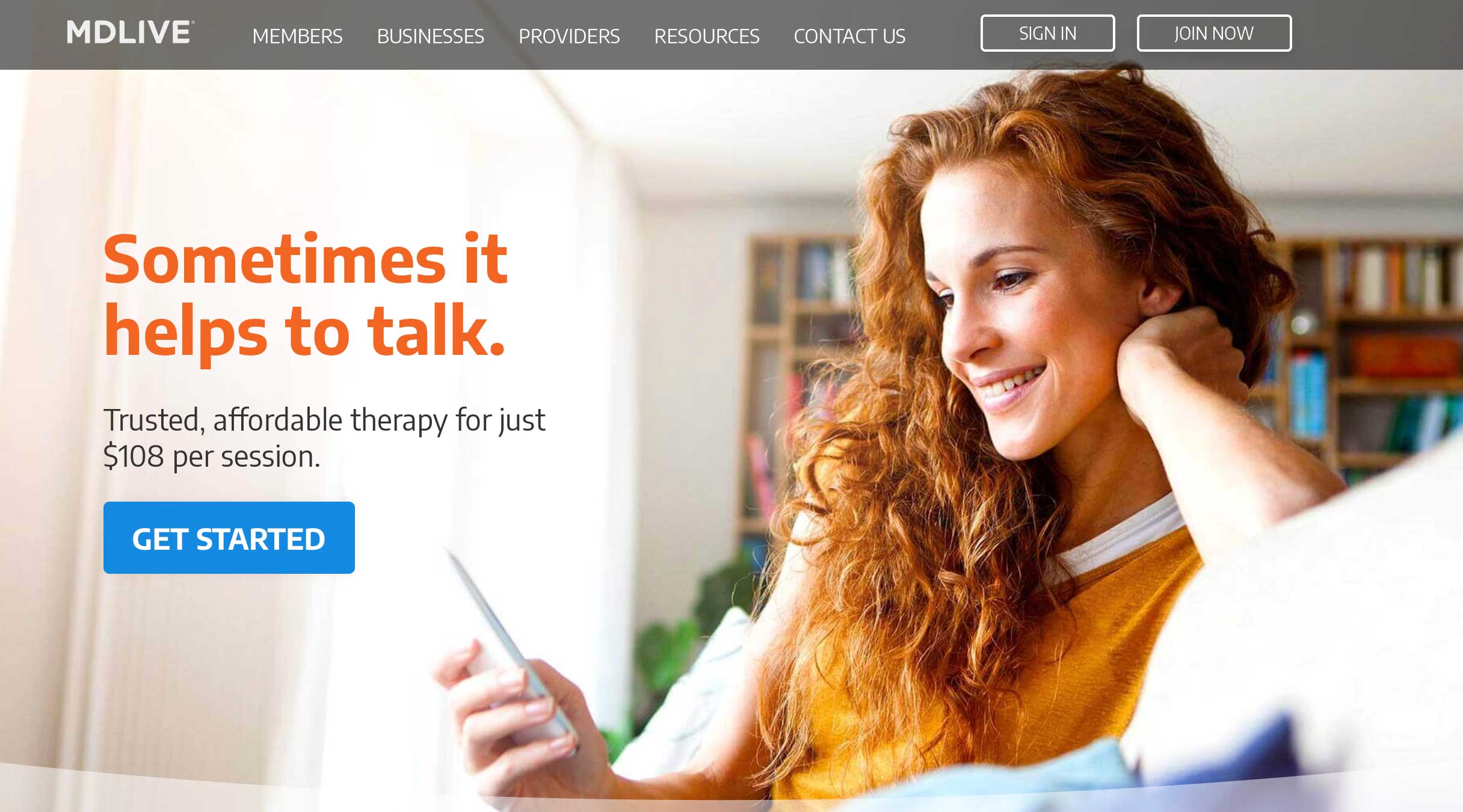
MDLive is a telehealth service that offers both physical and mental health care. Their behavioral health network includes both licensed therapists and psychiatrists, so you can get all the help you need, whether talk therapy alone is sufficient, or prescription medication is necessary.
To start therapy through MDLive, users simply create a free account. From there, they can browse profiles of available therapists, and choose the one they feel is the best fit. Most patients can get an appointment with their therapist within a few days, as opposed to waiting weeks with an in-person therapist. Sessions can be conducted via phone or video chat, through MDLive’s website or mobile app.
MDLive therapy sessions cost a flat rate of $108 per visit, although the service accepts several major health insurances, so depending on your coverage, your copay may be less.
| Price | Accepts Insurance | Other Features |
| $284 initial appointment, $108 per visit (w/o insurance) | Yes | — Mobile app — Desktop compatibility — 24/7/365 access — More features at MDLive |
Pros & Cons of MDLive
Pros:
- One of the advantages of getting online therapy through MDLive is that they also have psychiatry services available. Therefore, if a client needs medication to help them manage their mental health care needs, they can easily connect with a licensed physician who can prescribe medication.
- Another pro of MDLive’s online therapy services is the option to use health insurance to offset the cost, where available. Clients should confirm with their insurance provider that they cover MDLive’s teletherapy services prior to scheduling an appointment.
- MDLive’s services are available in nearly 50 languages, including Spanish, Vietnamese, Arabic, Japanese, Farsi, and more, making this an accessible platform for clients who are more comfortable speaking in a language that is not English.
Cons:
- At $108 per session, MDLive’s services are among the more expensive on our list. Individuals who have insurance may pay a lower copay for sessions, but for non-insured individuals, this price point may be cost-prohibitive.
- Unlike some of the other subscription-based services on our list, MDLive does not give therapy clients an option to message or connect with their therapist in between appointments.
What Customers Are Saying
MDLive’s therapy services are recommended by clients who have used them for a variety of mental and emotional health issues. One user writes,, “I was feeling conflicted about a relationship, and the therapist was of great help in sorting out my feelings.”
Scores
Ease of use: 90/100
Convenience factor: 90/100
Technology: 90/100
Personalization: 90/100
Overall score: 90/100
Pride Counseling – Best for LGBTQ+
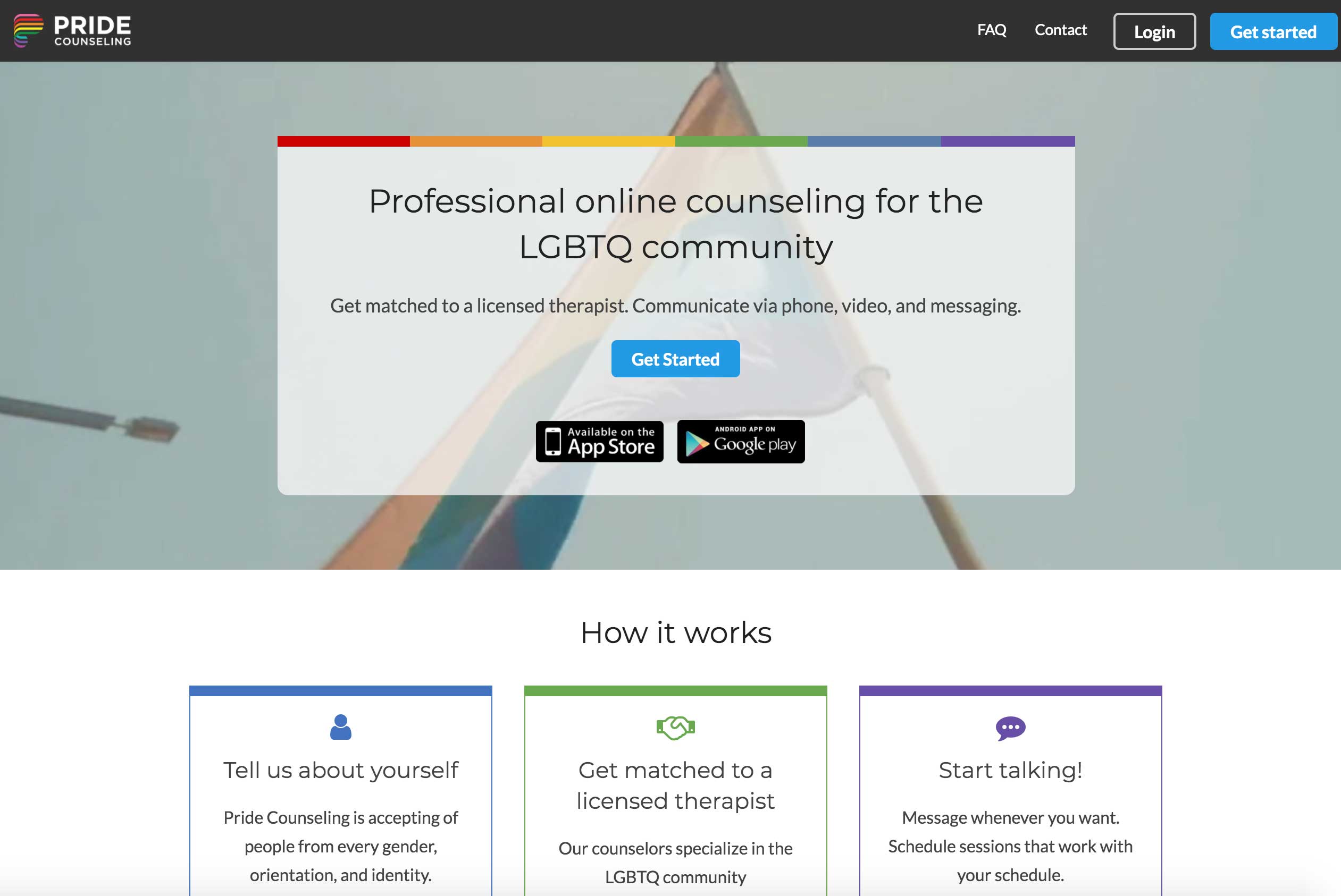
Individuals in certain under-represented populations may seek counseling that is geared specifically towards them, for both the issues that affect them personally and as part of a minority community. For members of the LGBTQ community, there’s Pride Counseling.
This online mental health service aims to provide therapy that is accepting of and accessible to everyone. Pride Counseling’s network of licensed professional counselors, licensed clinical social workers, and marriage and family therapists all specialize in working with the LGBTQ community, and can address issues like anxiety, depression, relationships, family, identity, and more.
Pride Counseling functions similarly to services like BetterHelp, in that users join and complete a questionnaire to get matched with a counselor. It operates on a subscription basis, and price per week varies based on location, client preferences, and therapist availability. Users can communicate with their counselors via video chat, phone call, live chat, and email messages. Pride Counseling is accessible via desktop or mobile app.
| Price | Accepts Insurance | Other Features |
| $60-$90 per visit (billed monthly) | No | — Mobile app — Desktop compatibility — 24/7/365 access — More features at Pride Counseling |
Pros & Cons of Pride Counseling
Pros:
- The main pro of Pride Counseling is its special focus on the LGBTQ+ community. This is a population that is disproportionately affected by mental health issues, and may also face judgement or misunderstanding in traditional therapy spaces. Pride Counseling employs therapists who have expertise in working with the unique needs of LGBTQ+ patients, creating a safe space where people can get the care they need.
- Pride Counseling also allows users to remain anonymous, which removes another obstacle that may prevent some LGBTQ+ individuals from seeking treatment.
- Pride Counseling’s services are available on a sliding scale, based on a client’s income, which may help make it more affordable for individuals to seek care through this platform.
- This platform also offers a variety of ways for clients and their therapists to communicate, making this a convenient way to get therapy in any situation.
Cons:
- The main con of Pride Counseling is that the platform does not accept any health insurance to cover the cost of services.
- Another drawback is the Pride Counseling does not have any psychiatrists on staff, meaning that clients who may need prescription medications to help them manage their mental health care needs will have to go elsewhere for those services.
What Customers Are Saying
Pride Counseling users call the service “truly life-changing.” Writes one client, “I was skeptical about how much therapy could help me, but my therapist is amazing. She helped me get in the right mindset with working towards change in my life. I can finally appreciate myself.”
Scores
Ease of use: 90/100
Convenience factor: 80/100
Technology: 90/100
Personalization: 80/100
Overall score: 85/100
IV. What You Need to Know About Online Mental Health & Therapy On-Demand Services
When it comes to mental health care, you may hear various phrases like “counseling,” “therapy,” and “psychiatry.” To find the service that’s right for you, it’s helpful to understand what they mean.
Counseling refers to the process of addressing a specific issue, such as an addiction or stress. Therapy, or psychotherapy, is generally meant to address broader mental and behavioral patterns. Psychiatry is an area of medicine focusing specifically on preventing, diagnosing, and treating mental illnesses, sometimes with medication.
Depending on an individual’s needs, these approaches can be used separately or together to address and manage mental health issues.
Choosing to pursue therapy online versus in-person is a personal choice that depends on your needs and limitations. One is not necessarily better than the other. Some people choose online therapy because it is cheaper, more convenient, and they have more ways to communicate with their therapist, while others prefer face-to-face interaction. If you are new to therapy, you may need to try a few methods to find what works best for you.
“One of the greatest impacts telehealth provides in mental health is the comfort, ease, and ability to be treated how you prefer. It is critical that patients receiving mental health services are comfortable in the environment and with their provider. Communicating asynchronously or replacing the doctor office with a patients’ home synchronously provides solace for many patients, providing a great experience for the patient,” says Mitchell Fong, Director of Telehealth at Renown Health.
Online therapy alone is not recommended as a treatment for individuals who have thoughts of hurting themselves or others; are in an emergency situation, or have been diagnosed with a severe mental illness.
V. Latest News
Within the last decade, online therapy has become significantly more prevalent, thanks in part to the growing de-stigmatization of mental illness, and emphasis on mental health care. There has been a sharpened focus on mental health in light of the COVID-19 pandemic, which has had a severe impact on people’s mental and emotional well-being.
Due to the pandemic, traditional face-to-face therapists have shifted their practices online, which has both positive and negative effects, and is expected to have long-term impacts on how therapy is delivered.
Online therapy is making counseling more accessible to those affected by other disasters, such as when a Texas university offered free teletherapy services to Hurricane Laura evacuees in August 2020.
During National Suicide Prevention Month, mental health advocates pointed to the rise in teletherapy in helping them address the mental and emotional health needs of those in California and beyond during COVID-19.
VI. Sources
- HealthyPeople.gov – Mental Health and Mental Disorders | Last accessed July 2025
- Mental Health America – Quick Facts and Statistics About Mental Health | Last accessed July 2025
- NPR – Pandemic’s Emotional Hammer Hits Hard | Last accessed July 2025
- Time – Online Therapy, Booming During the Coronavirus Pandemic, May Be Here to Stay | Last accessed July 2025

